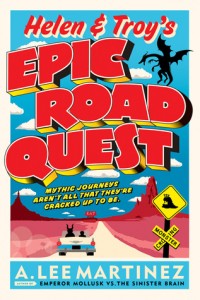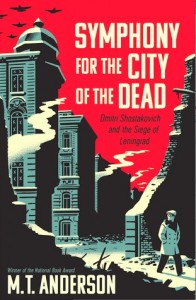Helen and Troy’s Epic Road Quest
A. Lee Martinez
Orbit
July 16, 2013
I have a couple of authors that I follow closely, anxiously awaiting the release of their next books. Martinez was one of those authors for many years, I’ve read everything he’s written since his first book, Gil’s All Fright Diner, in 2005. But this one slipped past me somehow and I was overjoyed when I picked it up at 57th Street Books.
Helen is just like most teenage girls: she has a light crush on a boy, the boy everyone has a crush on, named Troy. Mostly she’s content to just be friendly with him while they’re at work selling burgers at a fast food chain. Helen only works the register while Troy flips the patties because it would be pretty cruel to make a minotaur cook beef. Yes, Helen is a minotaur, hooves and all. When her boss tries to sacrifice her and Troy to a Lost God hamburger avatar, she saves them both, but then they must quest for the forgotten deity. Or die.
Thus begins the Epic Road Quest, complete with a shoddily drawn map, government agency advisors, a national park of dragons, hungry witches, and a pretty friendly cyclops. Martinez’s writing, like always, is fun and fresh. Everyone is witty, everyone’s a little unsure of themselves, and everyone feels real. Helen may be a Greek tragedy, but she’s a fully fleshed out woman character too. She’s strong, resourceful, and pretty cool for a teenager. There’s also a motorcycle gang of Orcs hot on their tails, all of whom are missing their day jobs and families in order to fulfill divine orders.
Summer may be over, but this is one road trip quest book you shouldn’t miss out on.
—Al Rosenberg
Symphony for the City of the Dead: Dmitri Shostakovich and the Siege of Leningrad
M.T. Anderson
Candlewick Press
September 22, 2015
In a previous life, I wanted to be a musicologist, a scholar who writes about music from the view of the arts, humanities, and history. Ok, maybe not in a previous life, but at least during college where I studied classical piano. I was a mediocre, at best, pianist and eventually came to realize that I would not be happy with music as a career. I loved playing and studying for myself, but hated performing. I still play and listen to classical music and have always loved and been intrigued by the Russian composers: Mussorgsky, Rimsky-Korsakov, and of course, the transcendent Rachmaninov. I blame my Ukrainian-born, Russian-taught college piano teacher who is one of the scariest, most compassionate, and talented artists I’ve ever known.
So, all that to say when I heard that Anderson, author of the brilliant Feed, was writing a YA book about Russian composer Dmitri Shostakovich I knew I had to read it. Shostakovich is a puzzle for many musicians and scholars because he was writing during the Stalinist regime in the Soviet Union and it’s still unclear to this day whether he toed the party line because of true belief or fear. It’s a complicated issue as many of Shostakovich’s friends were killed during the Great Purges and Stalin’s approval of his music waxed and waned all throughout his career. Anderson’s book does a great job of presenting the composer as a complex human being trying to survive in impossible situations. He also presents the many issues surrounding Shostakovich’s supposed memoirs, Testimony, with critical questioning and doubt.
The book, longlisted for this year’s National Book Awards, tracks Shostakovich’s life from his beginnings as an avant garde intellectual through the terrors of Stalin, and the invasion of the Nazis during World War II, when Shostakovich wrote his Seventh Symphony for the people of Leningrad. The Nazis besieged the cultural capital for over 800 days, one of the longest sieges ever recorded. People starved and froze to death as much due to the Nazis as their own government’s cruelty. Shostakovich’s symphony became a beacon of hope for many Russians during the war, even if the Soviet government used it against him later in life. The 50 pages of footnotes at the end of the book might make you think that this would be a dull read, but it’s fascinating. If you have any interest in the Russian front of World War II, classical music, or just a story about humanity in times of trial, check this book out.
—Anna Tschetter
Heart Shaped Box
Joe Hill
William Morrow
February 13 2007
Jude Coyne is an aging rock star who collects macabre trophies. When his assistant Danny finds a haunted suit for sale online, Jude purchases it without a second thought, hardly even remembering he bought it when it finally arrives in a large, black, heart-shaped box.
We soon learn that the suit is haunted by Craddock McDermott, a dowser and hypnotist by trade. It quickly becomes clear that he intends to kill Jude and anyone who tries to help him. When Jude tries to return the suit, he learns that Craddock is the step-father of one of his former groupies who committed suicide. Her sister, Jessica Price, conspired with their step-father after her death to curse the suit, and trick Jude into buying it, as retribution for “ruining Anna.”
When I first started reading, I didn’t think Heart-Shaped Box was all that scary. Disturbing, yes, but I didn’t feel the heart-pounding fear I was expecting. That’s because early in the book, it’s very easy to rationalize what’s happening, to see the clear cause and effect at work. Jude mistreats a mentally ill woman, her father seeks revenge. It’s a pretty simple formula. But as the assault continues and Craddock chases Jude and his girlfriend, Georgia, across multiple states, things start to unravel. Jude really isn’t as bad as Craddock and Jessica make him out to be, and as sympathy for him grows, so does the fear of Craddock. When it is revealed that Craddock’s intentions have very little to do with Anna and more to do with his own pride, he becomes a truly terrifying specter. I won’t give away too much, but when Hill reveals the truth about Craddock, Jessica, and Anna’s death, the true horror comes from the fact that there are just awful, evil people in the world, and no logic can rationalize their behavior.
I sought out this book because I wanted to be terrified, and it certainly did not disappoint.
—KM Bezner
Fifteen Dogs
André Alexis
Coach House Books
April 14 2015
If you’ve ever read anything about the gods of Ancient Greece, you know it wasn’t unusual for them to use and abuse humans. Whether they were bored, looking for a sexual partner or simply trying to prove a point, humans were not much more than playthings. So when André Alexis’s newest novel opens on two gods, in this case Hermes and Apollo, sitting in a (human) bar trying to settle a bet, it’s not particularly groundbreaking. What makes this story unique, however, is that they don’t use humans to settle their dispute. Instead they use dogs.
Determined to find out whether human intelligence brings happiness, they grant that particular gift to fifteen dogs spending the night in a veterinary clinic in Toronto, and from there the novel follows all fifteen throughout what remains of their lives. The once familiar, comforting world the dogs knew is no more. Not quite human, not quite dog, they find themselves in a new world, filled with strange and quite often dangerous challenges, with not even the guarantee of each other to rely upon. Some dogs embrace their new intelligence, creating language and even poetry with it. Others fear this new way of life and instead try and revert back to who they were before.
Fifteen Dogs is a deeply philosophical novel, about the rewards and dangers of our own intelligence and free will. Whether you’re a dog person or not, you can’t help but become deeply invested in these dogs and their struggles. And through the diversity and complexity of these animals, these characters, Alexis is able to comment on our society and the way we treat one another. Which means that at times this book can be challenging, and at other times it can be absolutely heart-breaking. But it’s always an honest and emotional read that calls on you to pause and take stock of your own life and your own quest for happiness. A few weeks ago this book was awarded the Giller Prize, one of the most prestigious awards a Canadian novel can receive, and I can’t think of a book this year more deserving of that honour.
—Christa
You’re Never Weird on the Internet (Almost)
Felicia Day
Touchstone Books
August 11 2015
Before getting into the meat and potatoes part of this review, I have to admit that I’m not really a Felicia Day fan. It’s nothing against her personally, I just haven’t seen the majority of things she’s famous for. I’ve only ever seen one episode of The Guild and Supernatural is still on my to-watch list. I did love Doctor Horrible and have watched the occasional Geek & Sundry video on YouTube but I’m far from a superfan. I appreciate, howeverm Day’s presence in media and respect all the hard work she’s done, which is why I ultimately decided I would like to check out her new biography. And in the end it was well worth the read.
The book starts out on the lighter side. Day shares awkward stories from her childhood. Stories that many of us can probably relate to in one way or another. She struggles to make friends and fit in, has an awkward first kiss, etc., etc. Her story telling style is relaxed and easy to read and she’s not afraid to laugh at herself—something she made abundantly clear by sharing her childhood Ultima-inspired poetry.
But it’s not all light and fluffy. She shares the challenges she’s overcome, her struggles with insecurity and anxiety, her addiction to World of Warcraft and her confrontation with GamerGate. Many of these chapters hit close to home for me. I too struggle with anxiety, and GamerGate continues to affect people around me. The World of Warcraft chapters in particular painted a familiar picture. I’ve never played the game myself but someone close to me had an experience similar to Day’s in many ways, and I am extremely grateful that she was so honest about the experience. I hope it will help more people understand that for some people it’s not as easy as simply turning off the computer.
Some people may consider Day a little young to be writing a memoir. And while it’s true, she’s not very old that just makes everything she’s accomplished that much more impressive–from her proficiency on the violin, to her degree in mathematics, to her success in making online videos. Whether you’re a fan, or just someone who spends a lot of time on the internet, I think you’ll find this book an inspiring and entertaining read.
—Christa

